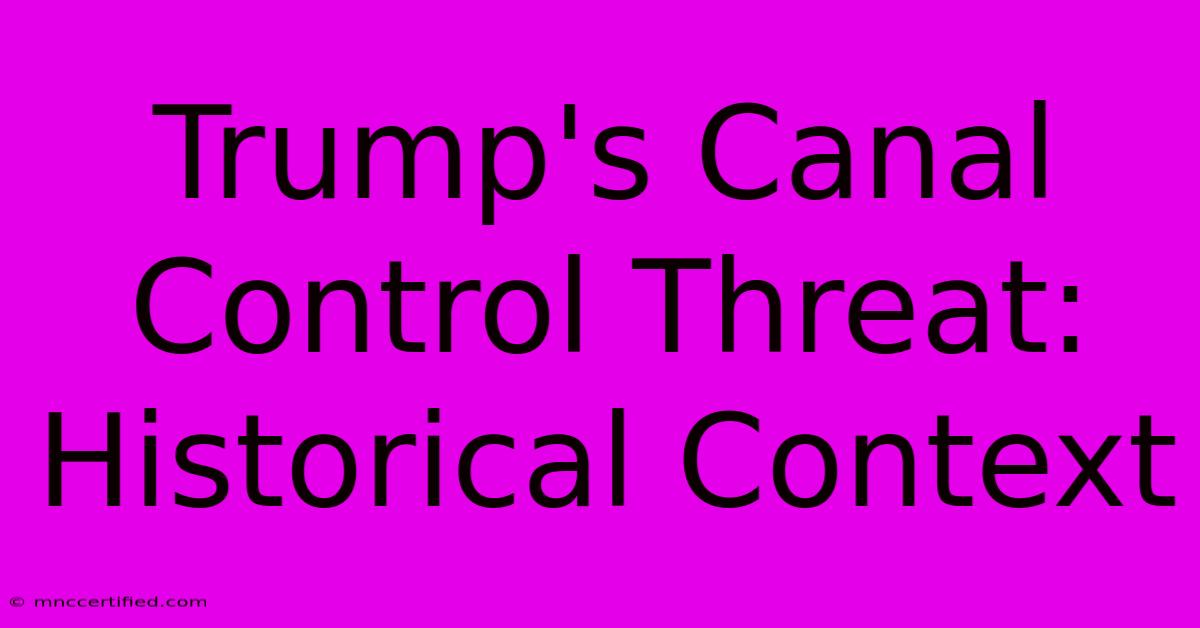Trump's Canal Control Threat: Historical Context

Table of Contents
Trump's Canal Control Threat: Historical Context
Donald Trump's pronouncements regarding control over the Panama Canal have sparked significant debate and raised questions about the historical context of US involvement in the region. Understanding this history is crucial to interpreting his statements and assessing their potential implications. This article delves into the historical context, exploring the complexities of US-Panama relations and the ongoing relevance of the canal's geopolitical significance.
The Hay-Bunau-Varilla Treaty and its Legacy
The story begins with the Hay-Bunau-Varilla Treaty of 1903. This treaty, negotiated under somewhat dubious circumstances, granted the United States control over a Canal Zone stretching ten miles wide across the Isthmus of Panama. The treaty's signing followed Panama's declaration of independence from Colombia, a move widely believed to have been facilitated by US support. This controversial act immediately ignited debate about US imperialism and its impact on Panamanian sovereignty. The treaty, while providing the US with the necessary land to build the canal, sowed the seeds of resentment that would continue to shape US-Panama relations for decades.
Exploitation and Resistance
For many years, the US presence in the Canal Zone was marked by unequal power dynamics and accusations of economic exploitation. Panamanians were largely relegated to secondary roles in the Canal's operation, despite its significant impact on their nation. This led to growing calls for greater Panamanian control over the canal and a sustained campaign for renegotiation of the treaty. This resistance took many forms, including protests, diplomatic efforts, and ultimately, a commitment to reclaiming Panamanian sovereignty.
The Torrijos-Carter Treaties: A Turning Point
A significant turning point arrived with the Torrijos-Carter Treaties of 1977. These treaties, negotiated between Panamanian dictator Omar Torrijos and US President Jimmy Carter, paved the way for the gradual transfer of control over the Panama Canal to Panama. The treaties represented a significant shift in US policy, recognizing Panamanian sovereignty and acknowledging the injustices of the past. The handover, completed on December 31, 1999, marked a symbolic and substantial victory for Panama.
Post-Handover Relations and the Enduring Importance of the Canal
Since the handover, the relationship between the US and Panama has evolved. While challenges remain, the transfer of control signified a mature step toward greater equality and mutual respect. The canal, however, continues to hold immense geopolitical importance, serving as a crucial shipping route connecting the Atlantic and Pacific Oceans. Its strategic significance makes it a point of ongoing interest for global powers, including the United States.
Trump's Statements: Assessing the Context
Against this backdrop, understanding Trump's statements on the Panama Canal requires careful consideration. His pronouncements, often characterized by a strong emphasis on American interests, must be viewed within the context of the long and complex history of US involvement in the region. Any perceived threat to Panamanian sovereignty would likely trigger strong reactions, both domestically in Panama and internationally.
The Importance of Diplomacy and International Law
The Panama Canal is governed by international treaties and agreements. Any unilateral action by the US that attempts to circumvent these agreements would be a violation of international law and could destabilize regional security. Diplomatic engagement and adherence to established norms remain crucial to maintaining stability and cooperation in the region.
Conclusion: A Legacy of Power and Sovereignty
Trump's threats, or perceived threats, regarding the Panama Canal serve as a powerful reminder of the enduring legacy of US involvement in Panama. The history of the canal is intertwined with the historical context of power dynamics, imperialism, and the ongoing struggle for sovereignty. Navigating this complex history is crucial for understanding current events and for promoting a future based on mutual respect and adherence to international law. Any discussion surrounding the Canal's future must engage seriously with its past, recognizing the sensitivity surrounding this vital waterway and the interests of all nations involved.

Thank you for visiting our website wich cover about Trump's Canal Control Threat: Historical Context. We hope the information provided has been useful to you. Feel free to contact us if you have any questions or need further assistance. See you next time and dont miss to bookmark.
Featured Posts
-
Detroit Injury News Facing The Chicago Bears
Dec 23, 2024
-
Commanders Win Daniels Comeback
Dec 23, 2024
-
Johansson Surprised By Josts Snl Joke
Dec 23, 2024
-
Jalen Hurts Eagles Qb Ruled Out Concussion
Dec 23, 2024
-
Colin Jost Scarlett Johansson Snl Joke Swap
Dec 23, 2024